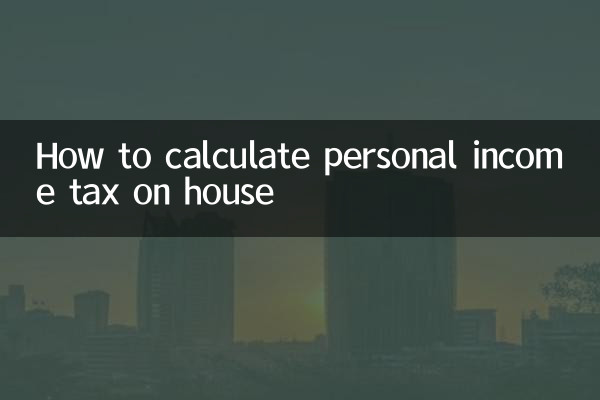How to calculate personal income tax on house
Recently, the calculation of personal income tax in real estate transactions has become a hot topic, and many home buyers and sellers have questions about it. This article will introduce in detail the calculation method of house personal income tax, and combine it with structured data to help readers quickly understand.
1. Personal income tax collection conditions

According to Chinese tax laws, individuals are subject to personal income tax on income derived from the sale of real estate. The conditions for collection are as follows:
| condition | illustrate |
|---|---|
| Property holding period | Those who have lived for more than 5 years and are the family’s only home are exempt from the tax. |
| Property type | Residential and non-residential tax rates are different |
| Transaction method | Different tax rates apply to different methods such as sale, gift, inheritance, etc. |
2. Personal income tax calculation method
The formula for calculating personal income tax is:Tax payable = (Transfer income - Original value of the property - Reasonable expenses) × 20%. The specific calculation method is as follows:
| project | illustrate |
|---|---|
| transfer income | The actual transaction price of the property sold |
| original value of property | Contract price or appraised price when purchasing a house |
| reasonable fees | Including decoration fees, agency fees, deed taxes, etc. |
3. Tax-free policy
Real estate transactions that meet the following conditions are exempt from personal income tax:
| condition | illustrate |
|---|---|
| More than 5 years old and the only place to live | The property has been held for more than 5 years and is the family’s only home. |
| inheritance or gift | Inheritance or gift among immediate family members is exempt from tax |
4. Frequently Asked Questions
1.How to prove that the property is the only residence?
It is necessary to provide household registration books, marriage certificates, real estate inquiry records and other materials for family members.
2.How are renovation costs deducted?
A formal invoice must be provided, and the maximum deduction limit is 10% of the original value of the property.
3.How are non-residential properties taxed?
Non-residential properties are subject to a tax rate of 20% and there is no tax exemption policy.
5. Latest policy developments
Recently, many places have introduced preferential tax policies for real estate transactions, and some cities provide personal income tax exemptions for real estate transactions that have been completed for two years. It is recommended that home buyers pay attention to local policy changes.
Summarize
The calculation of personal income tax in real estate transactions involves many factors. It is recommended to consult a tax professional or a real estate agent before the transaction to ensure compliance with tax regulations. Reasonable use of tax exemption policies can effectively reduce transaction costs.

check the details

check the details